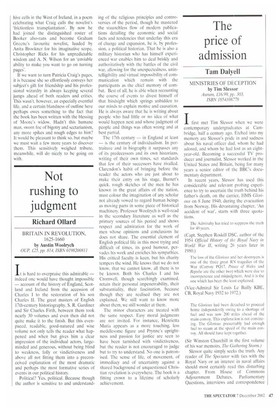Not rushing to judgment
Richard 01lard
BRITAIN IN REVOLUTION, 1625-1660 by Austin Woolrych OUP, £25, pp, 814, ISBN 0198200811 It is hard to overpraise this admirable — indeed one would have thought impossible — account of the history of England, Scotland and Ireland from the accession of Charles I to the restoration of his son Charles II. The great masters of English 17th-century historiography, S. R. Gardiner and Sir Charles Firth, between them took nearly 30 volumes and even then did not quite make it to the finish. But this evenpaced, readable, good-natured and wise volume not only tells the reader what happened and when but gives him a clear impression of the individual actors, largeminded and generous, without being blind to weakness, folly or vindictiveness and above all not fitting them into a preconceived explanation of the most dramatic and perhaps the most formative series of events in our political history.
Political? Yes, political. Because though the author is sensitive to and understand
ing of the religious principles and controversies of the period, though he mastered the staunchless flow of modern publications detailing the economic and social facts and tendencies that underlay this era of change and expansion, he is, by profession, a political historian. That he is also a military historian who has himself experienced war enables him to deal briskly and authoritatively with the battles of the civil war, allowing for the unexpectedness, unintelligibility and virtual impossibility of communication which remain with the participants as the chief memory of combat. Best of all, he is able when recounting the course of events to divest himself of that hindsight which springs unbidden to our minds to explain motive and causation. He is always aware that he is writing about people who had little or no idea of what would happen next and whose judgment of people and things was often wrong and at best partial.
The 17th century — in England at least — is the century of individualism. In portraiture and in biography it surpasses any of its predecessors and its own historians, writing of their own times, set standards that few of their successors have rivalled. Clarendon's habit of bringing before the reader the actors who are just about to make their entry on his stage, Burnet's quick, rough sketches of the men he has known in the great affairs of the nation, must colour the imagination of any scholar not already vowed to regard human beings as moving parts in some piece of historical machinery. Professor Woolrych is well-read in the secondary literature as well as the primary sources of his period and shows respect and admiration for the work of men whose opinions and conclusions he does not share. The essential element of English political life in this most trying and difficult of times, its good humour, pervades his work and enriches his sympathies. His critical faculty is keen, but his charity tempers the wind. He knows that we do not know, that we cannot know, all there is to be known. Both his Charles I and his Cromwell, though searchingly examined, retain their personal impenetrability, their substantiality, their fascination, because though they are realised they are not explained. We still want to know more about them, we still wonder at them.
The minor characters are treated with the same respect. Easy moral judgments are not invited, For instance, Henrietta Maria appears as a more touching, less meddlesome figure and Prynne's upright ness and passion for justice are seen to have been tarnished with vindictiveness, but the reader is not encouraged to judge but to try to understand. No one is patron ised. The sense of life, of movement, of immediacy and of uncertainty against a shared background of unquestioned Christian revelation is everywhere. The book is a fitting crown to a lifetime of scholarly achievement.










































































 Previous page
Previous page